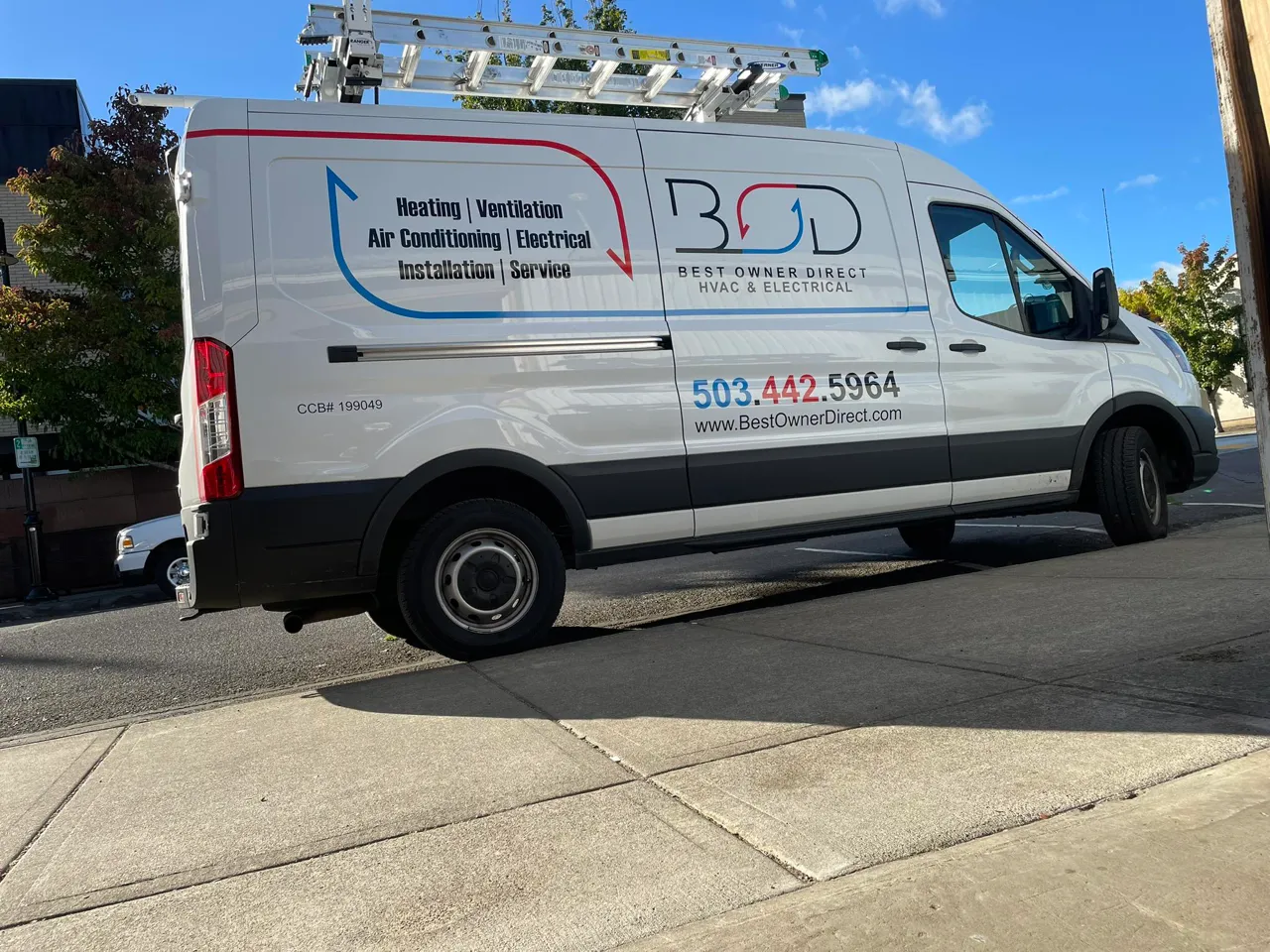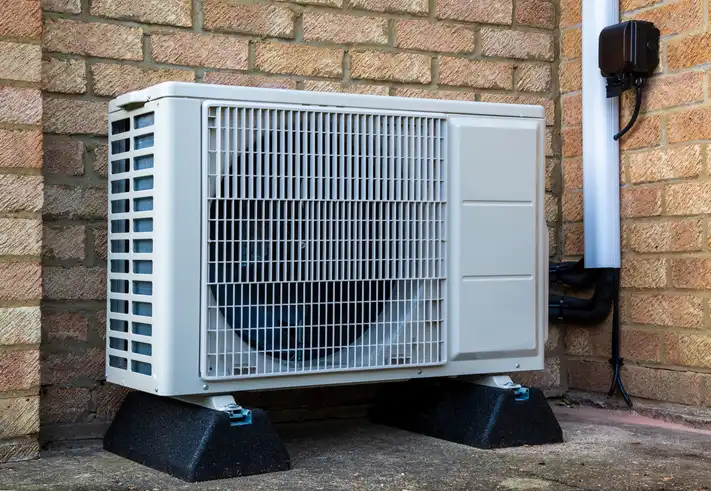Menu
Heat Pump Maintenance in Tigard, OR
Keep your split system running strong with heat pump maintenance in Tigard, OR from Best Owner Direct HVAC & Electrical in Tigard. Book your service today!

Keeping your heat pump tuned and reliable is essential for comfort in Tigard, OR, where wet winters and cool, damp shoulder seasons put extra demand on systems that run year-round for both heating and cooling. Proper heat pump maintenance from Best Owner Direct HVAC & Electrical prevents expensive breakdowns, preserves efficiency in both heating and cooling modes, and helps your system last longer — especially important in Portland-metro climates where outdoor units face moisture, debris, and seasonal temperature swings.
Why Seasonal Heat Pump Maintenance Matters in Tigard, OR
- Tigard’s mild but wet winters mean heat pumps run in heating mode frequently; defrost cycles, reversing valves, and outdoor coil condition are critical.
- Spring and fall transitions expose systems to pollen, leaves, and mud that reduce airflow and coil performance.
- Regular maintenance prevents winter failures during cold snaps and keeps cooling ready for warmer months.

Common heat pump issues in Tigard OR homes
- Reduced airflow from clogged filters, dirty coils, or blocked outdoor units.
- Inefficient heating or cooling caused by incorrect refrigerant charge or unnoticed leaks.
- Short cycling or no heat due to thermostat or control issues.
- Defrost cycle failure: outdoor coil frosting that doesn’t clear properly, reducing output.
- Reversing valve problems that prevent the system from switching between heating and cooling.
- Corrosion or physical damage to the outdoor unit from moisture and debris buildup.
- Excessive noise from failing motors, worn bearings, or loose electrical connections.
What a thorough heat pump seasonal inspection covers
A full maintenance visit focuses on the components that determine efficiency and reliability in Tigard’s climate. Typical inspection items include:
- Visual and operational check of both indoor and outdoor units.
- Air filter inspection and replacement or cleaning guidance.
- Blower, fan, and motor inspection for proper operation and airflow.
- Refrigerant level check and pressure measurements to identify leaks or incorrect charge.
- Reversing valve function test to confirm proper mode switching.
- Defrost cycle verification to ensure coils clear frost on schedule.
- Electrical inspection: tighten connections, test capacitors and contactors, check safety controls.
- Indoor and outdoor coil cleaning to restore heat transfer efficiency.
- Condensate drain and pan inspection to prevent water damage and microbial growth.
- Thermostat calibration and control verification for accurate temperatures.
Common diagnostic steps explained simply
- Observe system performance in both heating and cooling modes to spot intermittent faults.
- Measure refrigerant pressures to confirm the system is charged correctly — low charge commonly reduces heating capacity.
- Run a defrost cycle test: if coils stay iced or defrost runs continuously, technicians check sensors, timers, and the reversing valve.
- Check airflow and static pressure; restricted airflow is a leading cause of poor comfort and high energy use.
- Inspect electrical components; loose or failing electrical parts often cause noisy operation or prevent compressors from starting.
Typical repairs and solutions (non-technical explanations)
- Clean or replace filters and clean coils to restore airflow and efficiency.
- Tighten or replace electrical connections and components such as capacitors to restore reliable starting and quieter operation.
- Repair refrigerant leaks and recharge the system to factory-recommended levels to restore heating/cooling capacity.
- Replace or rebuild a failing reversing valve if the unit cannot switch modes reliably.
- Adjust defrost controls or replace faulty sensors to ensure proper defrosting and minimize ice buildup.
- Realign or clear the outdoor unit area: remove vegetation, debris, and ensure the pad is level to prevent airflow restriction and premature wear.
- Address condensate drain clogs to prevent water damage and indoor air quality issues.
Outdoor unit care specific to Tigard conditions
- Keep a 2–3 foot clearance around the outdoor unit; remove leaves, branches, and mud that collect in wet weather.
- Inspect for corrosion and protective coating wear; salt is not common, but prolonged dampness can promote rust.
- Avoid heavy covers that trap moisture over winter; light screening that keeps debris out while allowing drainage is preferable.
- Check the unit pad for settling after rainy seasons; a tilted unit can strain lines and connections.
Heat pump maintenance plans — what to expect and why they help
Recommended frequency: at least twice a year — once in fall to prepare for heating season and once in spring before cooling season. A maintenance plan typically includes:
- Scheduled seasonal inspections and prioritized appointment scheduling.
- Basic cleaning (filters and coils), airflow checks, refrigerant verification, and electrical safety checks.
- Documentation of system condition and recommended repairs with easy-to-understand notes.
Benefits of a plan:
- Consistent efficiency: properly maintained systems use less energy and keep bills lower.
- Fewer emergency repairs: preventive care identifies small problems before they fail.
- Longer equipment life: routine maintenance reduces wear on compressors and motors.
- Better comfort: balanced airflow, correct refrigerant, and working defrost cycles maintain steady indoor temperatures.
- Easier warranty compliance: many manufacturers require regular maintenance for warranty eligibility.
Practical maintenance tips for homeowners in Tigard
- Change or clean filters every 1–3 months depending on usage and indoor air quality.
- Keep the outdoor unit free of leaves and debris, especially after storms and during leaf-fall season.
- Monitor for unusual sounds, odors, or performance drops and log dates — this helps technicians diagnose intermittent issues.
- Keep vents and returns unobstructed and routine household cleaning reduced dust buildup.
- Consider a biannual professional inspection timed before October and before May to catch season-specific issues.
The payoff: efficiency, reliability, and peace of mind
Regular heat pump maintenance in Tigard, OR preserves efficiency across both heating and cooling modes, reduces the risk of inconvenient failures during cold or wet periods, and helps your system reach its expected lifespan. For homeowners who rely on their heat pump year-round, seasonal inspections and a simple maintenance plan are the most cost-effective way to ensure consistent comfort and dependable performance.
Ensure Year-Round Comfort with Heat Pump Maintenance
Don’t wait for a cold snap or summer heatwave to discover problems with your system. Best Owner Direct HVAC & Electrical provides expert heat pump maintenance in Tigard, OR, designed to keep your equipment efficient, reliable, and long-lasting. From coil cleaning to refrigerant checks and defrost cycle testing, our certified team ensures your system operates at peak performance. Schedule your seasonal maintenance today and enjoy consistent comfort and lower energy bills throughout the year.


